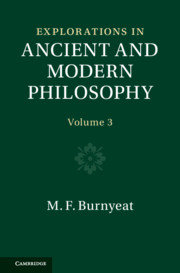Book contents
- Explorations in Ancient and Modern Philosophy
- Explorations in Ancient and Modern Philosophy
- Copyright page
- Contents
- Illustrations
- Preface
- Acknowledgements
- Abbreviations
- Introduction
- Part I The Republic
- Chapter 1 Plato on why mathematics is good for the soul
- Chapter 2 Long walk to wisdom
- Chapter 3 The truth of tripartition
- Chapter 4 Plato and the dairy-maids: the distribution of happiness inside and outside the ideal city of the Republic
- Chapter 5 Justice writ large and small in Republic IV
- Chapter 6 Fathers and sons in Plato’s Republic and Philebus
- Chapter 7 By the Dog
- Chapter 8 Culture and Society in Plato’s Republic
- The total culture: material, moral, musical
- First glance ahead: the divided soul in book X
- A tale of two cities
- Historical interlude: Greek couches
- Self-reflections in the cave
- Two types of imitator
- Second glance ahead: the form of couch in book X
- Modern analogies
- Plato’s programme
- Stage 1 of the reform: content
- Stage 2 of the reform: mimesis and the manner of performance
- Poetry and politics
- Stage 3 of the reform: musical technique
- Stage 4 of the reform: the material and social setting
- Retrospect on the reform in books II–III
- The reform resumed in book x: Homer as the first tragedian
- Does book X ban more mimesis than book III?
- Understanding mimesis
- Is book X’s concept of mimesis different from book III’s?
- The painted carpenter
- The poet’s knowledge
- The poet as maker
- The poet as painter
- The honeyed muse
- Back to the divided soul
- Chapter 8a Lecture I. Couches, song, and civic tradition
- Chapter 8b Lecture II. Art and the menace of mimesis
- Chapter 8c Lecture III. Farewell to Homer and the honeyed muse
- Part II The past in the present
- Appendix: The archaeology of feeling
- Bibliography
- Index locorum
Chapter 8b - Lecture II. Art and the menace of mimesis
from Chapter 8 - Culture and Society in Plato’s Republic
Published online by Cambridge University Press: 24 March 2022
- Explorations in Ancient and Modern Philosophy
- Explorations in Ancient and Modern Philosophy
- Copyright page
- Contents
- Illustrations
- Preface
- Acknowledgements
- Abbreviations
- Introduction
- Part I The Republic
- Chapter 1 Plato on why mathematics is good for the soul
- Chapter 2 Long walk to wisdom
- Chapter 3 The truth of tripartition
- Chapter 4 Plato and the dairy-maids: the distribution of happiness inside and outside the ideal city of the Republic
- Chapter 5 Justice writ large and small in Republic IV
- Chapter 6 Fathers and sons in Plato’s Republic and Philebus
- Chapter 7 By the Dog
- Chapter 8 Culture and Society in Plato’s Republic
- The total culture: material, moral, musical
- First glance ahead: the divided soul in book X
- A tale of two cities
- Historical interlude: Greek couches
- Self-reflections in the cave
- Two types of imitator
- Second glance ahead: the form of couch in book X
- Modern analogies
- Plato’s programme
- Stage 1 of the reform: content
- Stage 2 of the reform: mimesis and the manner of performance
- Poetry and politics
- Stage 3 of the reform: musical technique
- Stage 4 of the reform: the material and social setting
- Retrospect on the reform in books II–III
- The reform resumed in book x: Homer as the first tragedian
- Does book X ban more mimesis than book III?
- Understanding mimesis
- Is book X’s concept of mimesis different from book III’s?
- The painted carpenter
- The poet’s knowledge
- The poet as maker
- The poet as painter
- The honeyed muse
- Back to the divided soul
- Chapter 8a Lecture I. Couches, song, and civic tradition
- Chapter 8b Lecture II. Art and the menace of mimesis
- Chapter 8c Lecture III. Farewell to Homer and the honeyed muse
- Part II The past in the present
- Appendix: The archaeology of feeling
- Bibliography
- Index locorum
Summary
It is often said that in the Republic Plato proposes to ban art and poetry from his ideal society. The truth is that poetry – the right sort of poetry – will be a pervasive presence in the life of the warrior class whose upbringing and education are discussed in Books 2 and 3 of the Republic. What Plato develops here is a systematic anti-democratic programme for reforming music, i.e. musical poetry, incorporating dance as well as song. There are four stages in the programme: first, purging poetic content; second, placing severe restrictions on the manner of performance and on those permitted to engage in it, and particularly on the extent of mimesis or impersonation deemed allowable in performance, on account of its influence on character; third, placing similarly severe restrictions on musical technique, particular on the musical modes composers are allowed to employ in constructing melodies; and fourth, ensuring that the material and social settings in which musical poetry is performed are also designed with a gracefulness and beauty that will work their appropriate effect on the performers, providing the ideal conditions for them to fall in love, homoerotically conceived.
- Type
- Chapter
- Information
- Explorations in Ancient and Modern Philosophy , pp. 183 - 207Publisher: Cambridge University PressPrint publication year: 2022

